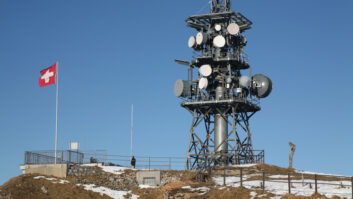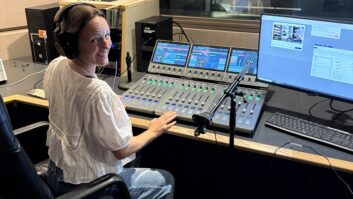Once again, Russia has dropped an Iron Curtain across the flow of independent news from the West. Add the millions of Ukrainian refugees on the move and damage to the country’s infrastructure, and the need for reliable, objective information in this war zone is as pressing now as it was at the height of the Cold War.
During the Cold War, long-distance shortwave radio broadcasts from the BBC, Voice of America, and Radio Free/Europe/Radio Liberty pierced the Iron Curtain with trustworthy news programming. Today, this old medium is being revitalized through the efforts of volunteer groups and SW broadcasters to get through the new Iron Curtain — and privately owned-and-operated U.S. SW broadcaster WRMI is at the heart of these efforts. WRMI does its own original programming, and sells airtime to third-party broadcasters to reach Europe and the Americas.
Jeff White is General Manager of WRMI, and Secretary-Treasurer of the National Association of Shortwave Broadcasters. He spoke with Radio World recently to tell us about WRMI’s pivotal role in transmitting much-needed content to Eastern Europe via shortwave radio.
Radio World: Let’s start with WRMI. Who are you, and when did you enter the shortwave radio market?

Jeff White: WRMI is a commercial shortwave station that went on the air in 1994 with one 50-kilowatt shortwave transmitter and one corner reflector antenna directed to Latin America. The site was Hialeah, Florida (a suburb of Miami). We operated there until December of 2013, when we had the opportunity to take over the large site of Family Radio (WYFR) in Okeechobee, about three hours north of Miami, on the north side of Lake Okeechobee, one of the largest freshwater lakes in North America.
WYFR was located on a one-square-mile cattle ranch leased from a local farmer, and it had 14 transmitters (12 of them were 100,000 watts) and 23 antennas beamed in 11 different azimuths to most of the world. When we took over WYFR’s site, we closed down the site in Miami. But we still use the name Radio Miami International and the call letters WRMI.
RW: How has your station ended up playing a pivotal role in delivering content to Eastern Europe via shortwave?
White: For many years, we have aired relays of some Eastern European former shortwave stations, namely Radio Prague International, Radio Slovakia International, Radio Tirana and Radio Ukraine International. These are in English, Spanish, French and Slovak, and beamed to different target areas in the Americas and Europe.
A few days after the Russian invasion of Ukraine, the English program of Radio Ukraine International was replaced by the domestic service in Ukrainian. We continued to air that service, which was especially important since many domestic radio stations in Ukraine were being destroyed, and because many Ukrainians were emigrating to various parts of Europe.
Then an organization called Shortwaves for Freedom contacted us and asked if we would have airtime available to transmit the Voice of America, Radio Free Europe and Radio Liberty to Eastern Europe. I said, “of course we would do so”. Shortwaves for Freedom is a crowdfunding group (www.fundrazr.com/radiowaves) and they wanted to get VOA and RFE/RL programs on shortwave, which were only on the Internet at the time. So we were happy to oblige.
In addition, we have had other organizations such as Radio for Peace International and some religious programs that have come to us for airtime since the war began.
RW: What programs are you broadcasting, and what equipment are you using to deliver it? And where does Radio Ukraine fit into this mix?
Jeff White: Here’s a list of what WRMI to broadcasting to Eastern Europe today.
- VOA “Flashpoint Ukraine” in English Monday-Friday 1930-2000 UTC on 15770 kHz
- Radio Liberty in Russian daily (7 days per week) at 0200-0300 and 0400-0500 UTC on 7730 kHz
- Radio Ukraine International daily (7 days per week) in Ukrainian (with a short newscast in English) at 0500-0600 UTC on 7730 kHz and various shorter weekly programs on 7730 and 15770 kHz. Both of these frequencies are from 100-kilowatt transmitters. 7730 is a rhombic antenna, and 15770 is a curtain array. Both are using an azimuth of 44 degrees.
[Visit Radio World’s Global News Page]
Radio World: Who is paying for these broadcasts?
White: Shortwave for Freedom is paying for the VOA and RFE/RL relays. We are paying for Ukrainian Radio broadcasts ourselves. And some of the religious programs and others are paying for their own airtime.
RW: Why have you decided to do this?
White: Well, we were broadcasting Radio Ukraine International for some years before the war as a result of some personal contacts we made with them. We had actually lost contact with them for a while, but we renewed contacts through an intermediary in Germany, and we started airing them again as the war began. But we really wanted to do anything we could to help the information vacuum in the region and to help the cause of the Ukrainian people. We’re not doing it for the money, but because it just needs to be done.
RW: What sort of listenership are you getting in Eastern Europe?
White: We receive a lot of listener reports from the region. That includes Russia, Belarus and Ukraine, as well as Poland, the Czech Republic, Slovakia, Hungary, Bulgaria, Romania and other parts of Eastern Europe.
A lot of listener reports don’t make comments on the war exactly, but many of them thank us for transmitting this programming. The day after we resumed airing Ukrainian Radio, we got a message on our Facebook page saying: “Thank you, from Kharkiv, Ukraine.” We got a similar message from a listener in Sumy, Ukraine.
We have received messages from listeners in various parts of Russia who have also thanked us for our programming and expressed their disdain for the war. And we have also received a few reports from Russia and Belarus who have criticized the broadcasts of Radio Liberty and who said they believe that what Russia is doing in Ukraine is necessary.
RW: Are more people coming to WRMI to broadcast content to Eastern Europe?
White: Yes, for example Radio for Peace International from France, which is now doing Russian-language news updates during the week. We have also had religious organizations who wanted to buy airtime to transmit to Ukraine and Eastern Europe. I think it is still increasing and there will be more organizations that are looking to reach this region in the coming weeks and months.
RW: Are you concerned about the Russians’ reaction to your broadcasts? Might they try to jam you, or worse?
White: As far as I know, the former Russian jamming transmitters are very much shut down, so I doubt they would be able to reactivate them — although you never know. But look, our broadcasts to Cuba on 9955 kHz have been jammed by the Cuban government since they went on the air in 1994, but people still hear us in Cuba. Jamming on shortwave is not very effective; a lot of it skips over the intended target. So I’m not too worried about jamming.
RW: What are your future plans in this area?
White: Well, as long as this unfortunate conflict persists, we’re in it for the long-haul. We will continue what we’re doing, and we will probably expand the transmissions. We have had calls from companies that want to help us expand broadcasts and even offers to help upgrade our equipment. It’s amazing, really. It seems that everyone wants to help out however they can, and we will do all we can also.







